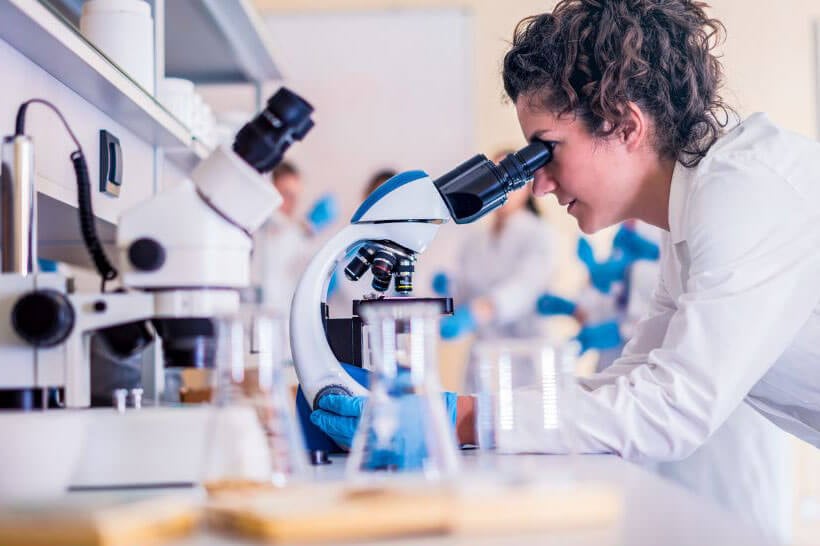Are you considering a career in science? Science is not only a career about exploration and discovery — it can also be financially rewarding. In this article, we'll delve into the world of science careers and share the highest-paying science jobs in 2026.
From geneticists who diagnose and treat genetic disorders to artificial intelligence research scientists shaping the future of AI, these high paying science jobs are from all kinds of scientific disciplines. Alongside famous figures like Carl Sagan and Francis Collins, you'll find roles that bridge science and technology, transforming industries and solving some of the most complex global challenges.
You'll also discover science jobs that have become increasingly crucial in today's world, from epidemiologists managing public health crises to meteorologists unraveling climate mysteries. As you explore these best paying science careers, remember that the impact you can make on the world is as vast as the universe itself. So, let's embark on this journey and uncover the myriad opportunities science has to offer.
Highlights of High Paying Science Jobs in 2026
- The science careers with the salary potential and growing demand include roles like Geneticist, Pharmacist, AI Research Scientist, Data Scientist, Machine Learning Engineer, and more.
- Salary ranges vary depending on your profession, experience, and location but most careers still get solid pay.
- The high paying science jobs are across disciplines: biological sciences, health sciences, environmental sciences, engineering, computer/information sciences, etc.
- To get a high-paid science job, you'll need a strong post-secondary education and specialized training! Online science courses with StraighterLine can be used as a pathway towards many roles.
- Some entry level science jobs include laboratory technician, research assistant, environmental technician, junior data analyst, or clinical research coordinator. There are also several science jobs that don't require a PhD.
What Are the Highest-Paying Science Jobs in 2026?
As we unveil our list of the top 20 high paying science jobs in 2026, it's important to note that salaries in these fields can vary widely based on factors such as location, experience, and education level. While we provide current salary data and insights into each profession, we encourage readers to consult our source information at the end of this article for the most up-to-date and comprehensive understanding.
1) Geneticist
Clinical Geneticists analyze and interpret genetic data, crucial in diagnosing and treating genetic disorders. Famous geneticists like Francis Collins, who led the Human Genome Project , have significantly advanced medical science.
National average salary: $94,262
National average salary range: $56,000 to $130,500
Sourced from ZipRecruiter
Degree Pathway: Geneticists typically need PhD in Genetics, Molecular Biology, or related field; postdoctoral research experience is common.
2) Pharmacist
Pharmacists are the folks who manage and dispense medications, playing a vital role in patient care.
National average salary: $137,480
National average salary range: $86,930 – $172,040
Sourced from BLS
Degree Pathway: Becoming a pharmacist requires a Doctor of Pharmacy (PharmD) degree and licensure; optional certifications include Board Certification in Pharmacotherapy (BCPS).
3) Artificial Intelligence Research Scientist
These scientists develop AI algorithms and systems. Notable figures like Andrew Ng have popularized AI through online courses and contributions to Google Brain.
National average salary: $130,117
National average salary range: $107,500 – $173,000
Sourced from ZipRecruiter
Degree Pathway: Artificial Intelligence Research Scientists usually study a master’s or PhD in Computer Science, AI, or Machine Learning; certifications in TensorFlow, PyTorch, or AWS ML can be advantageous.
4) Data Scientist
Data Scientists extract insights from large data sets. They've been pivotal in various sectors, from finance to healthcare, significantly impacting business strategies.
National average salary: $112,590
National average salary range: $63,650 – $194,410
Sourced from BLS
Degree Pathway: Data Scientists typically need a bachelor’s or master’s in Data Science, Statistics, Computer Science, or Math; popular certifications include Google Data Analytics, Microsoft Azure, or AWS Data Analytics.
5) Machine Learning Engineer
Machine Learning Engineers develop systems that learn from data, a field popularized by applications like Netflix's recommendation algorithm.
National average salary: $128,769
National average salary range: $101,500 - $193,500
Sourced from ZipRecruiter
Degree Pathway: To become a Machine Learning Engineer, you might get a bachelor’s or master’s in Computer Science, AI, or Engineering; certifications in deep learning frameworks or cloud ML platforms help.
6) Astronomer
Astronomers study celestial bodies, contributing to discoveries like exoplanets. Notable astronomers include Carl Sagan, who brought astronomy to the public through his series "Cosmos."
National average salary: $54,791
National average salary range: $31,500 - $128,500
Sourced from ZipRecruiter
Degree Pathway: Most Astronomers have a PhD in Astronomy, Astrophysics, or Physics; research experience and publications are critical.
7) Chemical Engineer
Chemical Engineers design chemical processes for manufacturing. Innovations like the creation of synthetic insulin have been spearheaded by chemical engineers.
National average salary: $121,860
National average salary range: $78,520 – $182,150
Sourced from BLS
Degree Pathway: Chemical Engineers need a bachelor’s in Chemical Engineering; optional licensure as a Professional Engineer (PE) enhances science job opportunities.
8) Research Scientist
These scientists conduct experiments across scientific disciplines. Rosalind Franklin , a research scientist, played a crucial role in understanding the structure of DNA.
National average salary: $130,117
National average salary range: $107,500 - $174,000
Sourced from ZipRecruiter
Degree Pathway: Research Scientists usually have a bachelor’s, master’s, or PhD in a relevant scientific field; specific certifications vary by industry.
9) Computational Scientist
These scientists solve complex problems using computational methods, essential in projects like climate modeling and disease simulation.
National average salary: $96,169
National average salary range: $94,500 - $137,000
Sourced from ZipRecruiter
Degree Pathway: Work as a Computational Scientist typically requires a master’s or PhD in Computer Science, Applied Math, or Computational Physics; programming expertise is essential.
10) Physicist
Physicists explore matter and energy. Stephen Hawking, renowned for his work on black holes, is a famous physicist.
National average salary: $94,805
National average salary range: $70,730 - $191,880
Sourced from ZipRecruiter
Degree Pathway: Physicists typically get their PhD in Physics or Applied Physics; research experience and publications are standard prerequisites.
11) Aerospace Engineer
Responsible for designing aircraft and spacecraft, Aerospace Engineers have been central to space exploration missions like NASA's Mars Rovers.
National average salary: $134,830 per year
National average salary range: $85,350 - $205,850
Sourced from BLS
Degree Pathway: Aerospace Engineers need a bachelor’s in Aerospace, Mechanical, or Aeronautical Engineering; PE licensure is optional for higher-level roles.
12) Electrical Engineer
These engineers develop electrical systems, contributing to advancements in renewable energy technologies.
National average salary: $118,780
National average salary range: $79,390 - $199,060
Sourced from BLS
Degree Pathway: Electrical Engineers usually get a bachelor’s in Electrical Engineering; Professional Engineer (PE) license or certifications in electronics or power systems can boost advancement.
13) Material Scientist
Material Scientists develop new materials, like Gorilla Glass, used in smartphones and tablets.
National average salary: $86,620
National average salary range: $61,460 - $168,500
Sourced from BLS
Degree Pathway: Material Scientists typically get a master’s or PhD in Materials Science, Chemistry, or Engineering; research experience is highly valued.
14) Hydrologist
Hydrologists study water in the environment, crucial for managing water resources and understanding climate change impacts.
National average salary: $62,774
National average salary range: $38,000 - $88,500
Sourced from ZipRecruiter
Degree Pathway: Becoming a Hydrologist usually takes a bachelor’s in Hydrology, Environmental Science, or Geology; certifications such as Certified Hydrologist (CHg) can help.
15) Bioinformatics Specialist
These specialists use computational tools for biological data analysis, key in projects like the ENCODE project mapping human DNA elements.
National average salary: $94,474
National average salary range: $64,900 - $127,900
Sourced from ZipRecruiter
Degree Pathway: Bioinformatics Specialists usually get a bachelor’s or master’s in Bioinformatics, Computational Biology, or Genetics; certifications in R, Python, or genomics software are useful.
16) Biomedical Scientist/Researcher
These scientists conduct medical research, leading to developments like CRISPR, a gene-editing technology.
National average salary: $100,590
National average salary range: $61,860 – $168,210
Sourced from BLS
Degree Pathway: Biomedical Scientist/Researcher normally requires a bachelor’s, master’s, or PhD in Biomedical Science, Biology, or related fields; clinical research certifications may be advantageous.
17) Meteorologist
Meteorologists study weather and climate, vital for understanding phenomena like El Niño and climate change.
National average salary: $96,278
Sourced from ZipRecruiter
Degree Pathway: Meteorologists need a bachelor’s in Meteorology, Atmospheric Science, or Physics; AMS Certification is recommended for forecasting careers.
18) Epidemiologist
Epidemiologists study disease patterns, playing a critical role in managing public health crises like the COVID-19 pandemic.
National average salary: $85,222
National average salary range: $64,000 - $101,000
Sourced from ZipRecruiter
Degree Pathway: Epidemiologists need a master’s in Public Health (MPH) or Epidemiology; certifications include CIP (Certified in Public Health) or EPIC.
19) Computer Systems Analyst
These analysts design computer systems for businesses, integral in digital transformations across various industries.
National average salary: $103,790
National average salary range: $63,160 – $166,030
Sourced from BLS
Degree Pathway: Systems Analyst usually get a bachelor’s in Information Systems, Computer Science, or Business IT; certifications such as CBAP, ITIL, or Microsoft/Oracle systems are valuable.
20) Biomedical Engineer
Biomedical Engineers combine engineering with medical sciences to create healthcare devices, like the artificial heart.
National average salary: $94,807
National average salary range: $60,000 - $130,000
Sourced from ZipRecruiter
Degree Pathway: Biomedical Engineers need a bachelor’s in Biomedical Engineering or related engineering discipline; certifications in clinical engineering or regulatory compliance are optional.

What Are Other Scientific Fields With In-Demand Jobs?
The high paying science jobs can be broadly categorized into several key areas:
Physical Sciences
Biological Sciences
Environmental Sciences
Computer and Information Sciences
Engineering Sciences
Health Sciences
Agricultural Sciences
Each of these fields offers a variety of career paths, reflecting the broad range of scientific knowledge and its applications in the modern job market. Knowing these branches can help you understand what areas of study the top paying jobs in science fall under.
In our quest to offer a comprehensive look at high paying science jobs, we've gone beyond the top 20 list to compile an extensive roster of popular science jobs. It's important to note that these roles, though they may not have cracked the top 20 in terms of pay, are by no means less impactful in the world of science — in fact, they may align more closely with what you're seeking in a science profession.
The following lists include many of the top 20 jobs previously mentioned in the article, offering a cohesive understanding of how these popular science positions intersect with their respective fields of study. Let's explore the multitude of possibilities that the world of science has to offer.
Physical Sciences
The physical sciences encompass disciplines like physics and chemistry, which explore the fundamental properties of matter and energy. These sciences underpin advancements in technology, from the development of materials like superconductors to innovations in energy storage and transportation.
Physicist: Physicists conduct research and experiments to gain insights into the fundamental laws of nature. They often specialize in fields such as astrophysics, quantum physics, or applied physics.
Chemist: Chemists engage in the study of chemicals and their properties, interactions, and practical applications. They may choose to specialize in areas such as organic chemistry, inorganic chemistry, or biochemistry.
Geologist: Geologists focus on the examination of Earth's materials, history, and geological processes. They commonly work in fields like natural resource exploration, environmental consulting, and academia.
Astronomer: Astronomers explore celestial bodies and phenomena beyond Earth's atmosphere. Their work typically involves conducting research, making observations, and developing theoretical models.
Material Scientist: Material scientists investigate and develop materials with novel or enhanced properties for various industries, including technology, manufacturing, and healthcare.
Meteorologist: Meteorologists study weather and climate, encompassing tasks ranging from weather forecasting to researching climate change and atmospheric processes.
Marine Biologist: Marine biologists specialize in the study of the ocean, covering aspects such as marine ecosystems, ocean currents, and seafloor geology.
Environmental Scientist: Environmental scientists are involved in the study and management of the environment, focusing on tasks like pollution control, natural resource management, and sustainability.
Science Educator: Science educators teach physical sciences at various educational levels, from high school to university, often integrating teaching with their own research.
Biological Sciences
Biological sciences study living organisms and their interactions. They have led to breakthroughs in healthcare through the understanding of genetics, biochemistry, and microbiology. Biologists contribute to areas such as genetic engineering, pharmaceuticals, and ecosystem conservation.
Biotechnologist: Biotechnologists are involved in the development and application of products and processes for industries like healthcare, agriculture, and environmental conservation. They often utilize living organisms or their components to achieve these goals.
Microbiologist: Microbiologists specialize in the study of microorganisms, including bacteria, viruses, and fungi. They frequently work in healthcare, pharmaceuticals, or research settings to investigate the properties and behaviors of these tiny life forms.
Geneticist: Geneticists focus on the science of genes, genetic variation, and heredity. They work in various areas, including medical genetics, agricultural genetics, or genetic counseling to better understand and manipulate genetic information.
Environmental Biologist: Environmental biologists study the natural environment and its interactions with various species. They play key roles in conservation efforts, environmental assessment, and the development of policies aimed at protecting ecosystems.
Biochemist: Biochemists merge the fields of chemistry and biology to explore the chemical processes within and related to living organisms. They are often involved in medical and pharmaceutical research to unravel the molecular intricacies of life.
Wildlife Biologist: Wildlife biologists focus on studying animals and their ecosystems, with a particular emphasis on conservation, wildlife management, and ecological research to safeguard biodiversity.
Biological Technician: Biological technicians provide crucial support to biological and medical scientists by setting up experiments, collecting data, and analyzing results, primarily in research laboratories to facilitate scientific discoveries.
Environmental Sciences
Environmental sciences examine the Earth's ecosystems and the impact of human activities on the environment. These sciences play a critical role in addressing global challenges such as climate change, pollution control, and sustainable resource management, affecting our planet's health and future.
Environmental Consultant: Environmental consultants provide guidance on environmental policy and compliance with regulations, often collaborating with businesses and government agencies to ensure responsible and sustainable practices.
Conservation Scientist: Conservation scientists are dedicated to safeguarding natural resources, focusing on the sustainable management of lands and ecosystems to preserve biodiversity and ecological balance.
Environmental Educator: Environmental educators teach and raise awareness about environmental issues, typically working in schools, non-governmental organizations (NGOs), or community organizations to inform and inspire people to take environmentally responsible actions.
Environmental Engineer: Environmental engineers apply engineering principles to address environmental challenges, such as waste management, pollution control, and the design of sustainable solutions to minimize the ecological footprint.
Hydrologist: Hydrologists focus on the movement, distribution, and quality of water, playing a vital role in water conservation and management by studying and managing water resources.
Geographic Information Systems (GIS) Specialist: GIS specialists utilize GIS technology to analyze and interpret environmental data, supporting a wide range of conservation and resource management projects by providing valuable spatial insights.
Computer and Information Sciences
Computer and information sciences drive the digital age, enabling innovations in computing, data analysis, and information systems. They impact fields as diverse as artificial intelligence, cybersecurity, software development, and data science, shaping how we communicate, work, and access information.
Data Scientist: Data scientists employ scientific methods, including statistical analysis and machine learning, to analyze and interpret complex data sets, extracting valuable insights and trends.
Machine Learning Engineer: Machine learning engineers are responsible for developing algorithms and models using scientific methods, enabling machines to learn from data and make intelligent decisions.
Bioinformatics Specialist: Bioinformatics specialists combine expertise in biology, computer science, and information technology to analyze and interpret biological data, particularly relevant in fields like genetics and genomics.
Computational Scientist: Computational scientists harness advanced computing capabilities to address intricate scientific problems, often applying their skills in disciplines such as physics, chemistry, or biology.
Systems Analyst: Systems analysts utilize scientific and analytical approaches to design and assess computer systems, software, and networks, ensuring their efficiency and functionality.
Artificial Intelligence Research Scientist: Artificial intelligence research scientists concentrate on creating innovative AI technologies and algorithms, requiring a strong foundation in scientific research methods to push the boundaries of AI advancements.
Engineering Sciences
Engineering sciences apply scientific principles to design and create practical solutions for various industries. Engineers contribute to fields such as civil engineering, mechanical engineering, and aerospace engineering, shaping infrastructure, transportation, and technological advancements.
Electrical Engineer: Electrical engineers specialize in the design and development of electrical systems and components, including circuit boards, motors, and power generation equipment.
Chemical Engineer: Chemical engineers apply principles of chemistry, physics, biology, and mathematics to address challenges related to the production or utilization of chemicals, fuels, pharmaceuticals, food, and various other products.
Aerospace Engineer: Aerospace engineers focus on designing and testing aircraft, spacecraft, satellites, and missiles. They may have specializations in areas such as aerodynamic fluid flow or structural design.
Biomedical Engineer: Biomedical engineers merge engineering principles with medical and biological sciences to conceive and produce equipment, devices, computer systems, and software used in healthcare, contributing to advancements in medical technology.
Materials Engineer: Materials engineers are responsible for developing, processing, and testing materials used in the creation of a wide range of products, from computer chips and aircraft wings to golf clubs and biomedical devices.
Health Sciences
Health sciences encompass fields like medicine, pharmacology, and public health. They have a profound impact on healthcare delivery, disease prevention, and medical research, leading to advancements in areas such as telemedicine, drug development, and epidemiology.
Pharmacist: Pharmacists dispense medications prescribed by physicians and other healthcare practitioners, and they provide patients with essential information about medication usage and potential side effects.
Biomedical Scientist/Researcher: Biomedical scientists and researchers conduct studies and research to advance our understanding of human health and diseases, contributing to the development of medical knowledge and potential treatments.
Clinical Laboratory Technologist: Clinical laboratory technologists perform tests and analyses on samples of bodily fluids, tissues, and other substances to assist in diagnosing, treating, and preventing diseases, playing a crucial role in healthcare diagnostics.
Epidemiologist: Epidemiologists investigate the patterns, causes, and effects of health and disease conditions within defined populations. They are instrumental in understanding and controlling public health issues and outbreaks.
Dietitian: Dietitians, with a focus on the science of food and its impact on health, help individuals make informed choices about their diet and nutrition, promoting better health and well-being through dietary guidance.
Healthcare Scientist: Healthcare scientists apply principles of biological science in clinical settings, often specializing in areas such as infection sciences or blood sciences to support medical diagnosis and treatment.
Agricultural Sciences
Agricultural sciences focus on improving crop production and food security. They contribute to sustainable agriculture, crop genetics, and agricultural technology, addressing global challenges related to food production and supporting the agricultural industry.
Agronomist: Agronomists specialize in soil management and crop production, working to enhance farming practices and increase crop yields.
Food Scientist/Technologist: Food scientists and technologists are involved in the study of food production and processing, with a focus on improving food quality, safety, and nutritional value.
Animal Scientist: Animal scientists study the biology and management of domestic animals, often concentrating on nutrition, breeding, and enhancing productivity.
Agricultural Engineer: Agricultural engineers apply engineering principles to agriculture, including the design of machinery, development of crop irrigation systems, and the creation of more efficient farming practices.
Soil Scientist: Soil scientists examine soil properties to assess its suitability for different types of plants and analyze how various soil treatments impact plant growth.
Horticulturist: Horticulturists specialize in the cultivation of a wide range of plants, including fruits, vegetables, nuts, herbs, flowers, and ornamental trees, with an emphasis on their growth and maintenance.
Forester/Forest Scientist: Foresters and forest scientists manage and conserve forested lands for sustainable timber production, wildlife habitat preservation, water resource protection, and recreational use.
Agricultural Extension Agent: Agricultural extension agents provide educational outreach to farmers and the agricultural community, offering guidance and solutions for various agricultural issues.
Environmental Consultant (Agriculture Focus): Environmental consultants with an agriculture focus provide advice on environmental best practices in agriculture, including sustainability and conservation efforts.
Fisheries Scientist/Aquaculturist: Fisheries scientists and aquaculturists manage and research the breeding, rearing, and harvesting of fish and other aquatic organisms, contributing to the sustainable development of aquatic resources.
High Paying Science Jobs That Transcend Multiple Areas of Study
And now to wrap up our list, here are a handful of the best paying science careers that blend disciplines, innovating and advancing knowledge across the vast spectrum of science.
Research Scientist: Research scientists play a crucial role in exploring and understanding the world around us. They conduct experiments and analyze data in labs, focusing on specific areas like medical research, meteorology, or pharmacology. Their work ranges from writing scientific papers to developing new solutions for complex problems. You'll find them in diverse settings, from universities to government labs, always pushing the boundaries of science.
Science Policy Advisor: Science policy advisors analyze scientific data and research to inform and shape public policy. They work with government agencies, non-profit organizations, and private sector companies to translate scientific findings into effective policies and programs that address challenges such as health, environment, and technology advancements.
Science Educator: Science educators are vital in instilling the importance of science in the next generation. They teach a range of scientific disciplines, from physics to biology, in various educational settings. These educators not only impart fundamental scientific knowledge but also inspire curiosity and critical thinking. Through engaging teaching methods, they play a crucial role in shaping future scientists and informed citizens.
Lab Technician/Research Assistant: Lab technicians and research assistants provide vital support for scientific research by conducting experiments and analyzing results in fields such as chemistry, physics, and geology.

How to Prepare for a Career in Science?
If you’re interested in high paying science jobs, you’ll need post-secondary science education and training. You can find more specific degree paths for each science career above.
Whether you need to complete a prerequisite, complete admission requirements, or just want to get ahead on your degree, you can enroll in a science course online at StraighterLine. Here are just a few science classes to choose from:
Take a look at all StraighterLine Science Courses.
How to Succeed in Online Science Classes?
Each StraighterLine class includes tutoring and textbooks for no additional fee. So, you will always have the help you need when you need it. Sign up for one of our science courses today and start immediately!
Our Sources & Resources on Science Jobs
Our data for the salaries in this article was compiled from the Bureau of Labor Statistics and ZipRecruiter on September 12, 2025. Not every job appeared on both job sites, so some of the salary data is only from one source. For more in-depth information about how these salaries are computed, here is the methodology used by ZipRecruiter.com.
Here are a few additional resources that were used in our research:
FAQs
What education, training, or skills are required for high-paying science careers?
Most high-paying science jobs require at least a bachelor’s degree in a relevant field. It's often necessary to also have specialized certifications, technical skills, or graduate-level education for more advanced roles.
Are there science careers that don’t require advanced degrees but still pay well?
Yes; roles like laboratory technician, clinical research coordinator, or certain data analyst positions can offer strong salaries with a bachelor’s degree and relevant technical skills or certifications.
Which science degrees lead to the highest salary?
Science degrees in Pharmacy (PharmD), Computer Science/Artificial Intelligence, Data Science, Biomedical Engineering, Chemical Engineering, and Physics tend to lead to the highest-paying science careers. Advanced degrees like a master’s or PhD can further increase earning potential, especially in research, AI, or specialized engineering roles.
What are the highest paid science jobs that don't require a PhD?
Several high-paying science careers do not require a PhD including pharmacists (PharmD required), biomedical engineers, data scientists, machine learning engineers, and certain laboratory or research technician roles. Typically, these positions still require a bachelor’s or master’s degree and relevant certifications or specialized training.
What are some of the best entry level science jobs?
Some of the entry-level science jobs suited to recent graduates include laboratory technician, research assistant, environmental technician, junior data analyst, or clinical research coordinator. Most require a bachelor’s degree in a relevant scientific field, and some may offer on-the-job training or internships to build practical experience.
What science jobs can I do remotely?
Several science roles can be done remotely, including data scientist, bioinformatics specialist, computational scientist, medical or scientific writer, clinical data manager, and regulatory affairs specialist.












